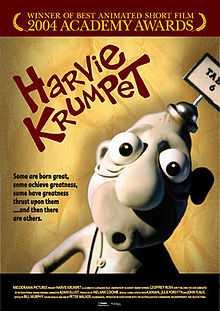Harvie Krumpet
| Harvie Krumpet | |
|---|---|
 Poster for Harvie Krumpet | |
| Directed by | Adam Elliot |
| Produced by | Melanie Coombs |
| Written by | Adam Elliot |
| Starring |
Geoffrey Rush Julie Forsyth Kamahl John Flaus |
| Studio |
Australian Film Commission SBS Independent Film Victoria |
| Distributed by |
Melodrama Pictures (Australia) Monster Distributes (Ireland) Atom Films (USA) |
| Release dates |
|
| Running time | 22 minutes and 7 seconds |
| Country | Australia |
| Language | English |
Harvie Krumpet is an Australian clay animation made in Melbourne written, directed and animated by Adam Elliot and produced by Melanie Coombs. This short (22 min and 7 sec) film won the Academy Award for Animated Short Film in 2003, in addition to numerous festival awards and the 2004 Australian Film Institute Best Short Animation award. It was also included in the Animation Show of Shows.
Synopsis
The story revolves around the life of Harvek Milos Krumpetzki, born in Poland in 1922. At the outbreak of World War II he comes to Spotswood in Australia as a refugee and changes his name to Harvie Krumpet. Despite a life filled with bad luck (such as having Tourette syndrome, being struck by lightning and losing one of his testicles), Harvie remains ever optimistic, living out his own eccentric way of life, marrying a nurse he meets in hospital and raising an adoptive daughter, who is a Thalidomide baby. Throughout his disaster-ridden life, people around him come and go, but right to the end Harvie delights in the simple pleasure of life. In one of the pivotal episodes of his life, Harvie sits in the park next to a statue of Horace while he hears the instructional Carpe diem, which inspires him to make many changes in his life, such as embracing the naturist ways and embarking on daring rescue missions for animal rights.
The film ends with one of Harvie's many "fakts", which he had been collecting throughout the film. "Fakt 1034: Life is like a cigarette, smoke it to the butt".
Soundtrack
- Canon in D Major by Johann Pachebel
- Dies Irae written by Giuseppe Verdi
- God is Better than Football by Keith Binns
- Ancient Airs and Dances by Ottorino Respighi
See also
- List of Australian films
- Mary and Max (another claymation film directed by Adam Elliot)
External links
- Official website
- Harvie Krumpet at the Internet Movie Database
- Harvie Krumpet at the Big Cartoon DataBase
- Melodrama Pictures official website
- Sleepy Brain's interview with Adam Elliot
- Xdafied.com.au interview with Adam Elliot
- Harvie Krumpet at the National Film and Sound Archive
| ||||||||